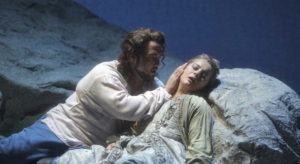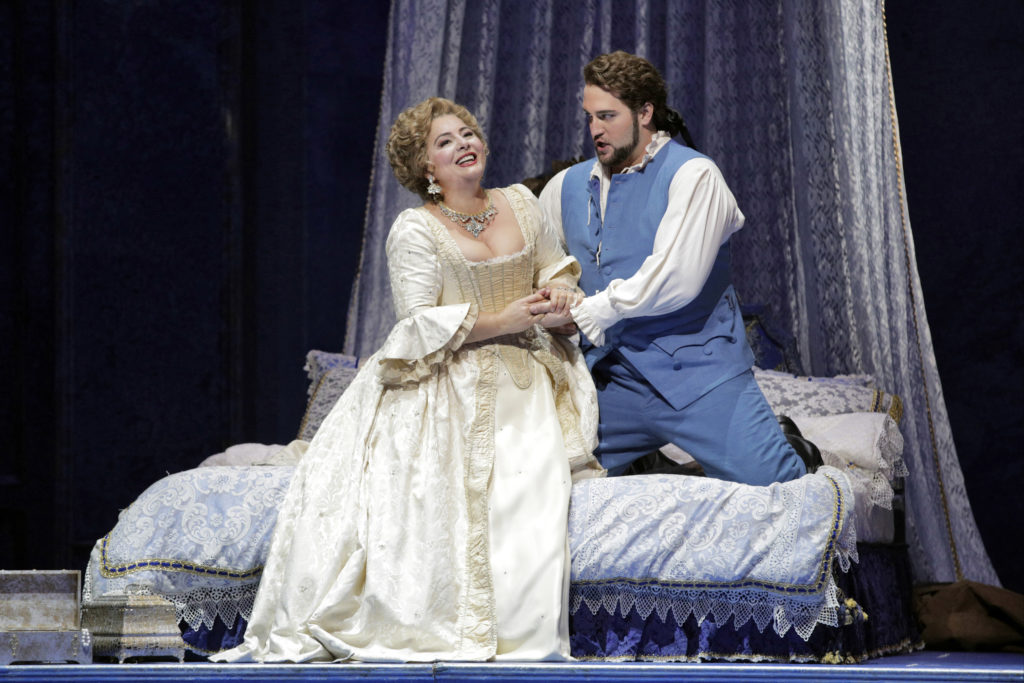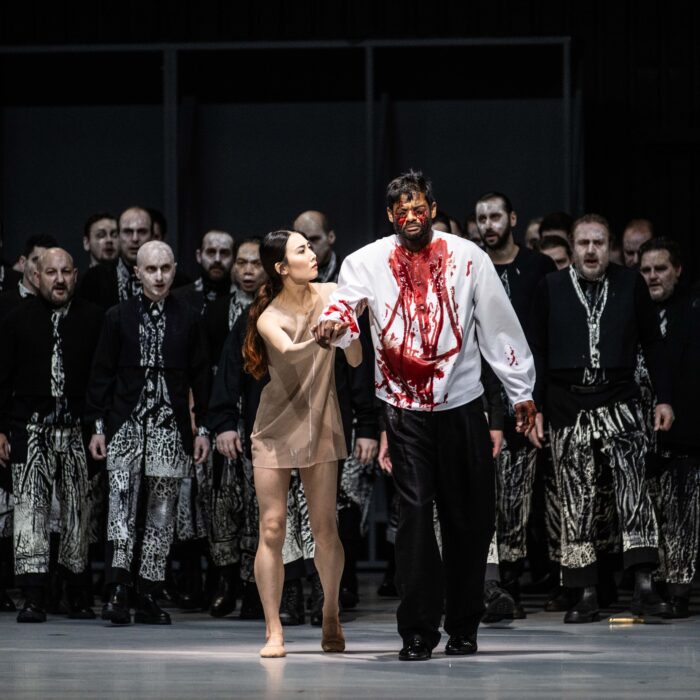
San Francisco Opera 2019-20 Review: Manon Lescaut
By Lois Silverstein“Manon Lescaut” opened at the San Francisco Opera in a revival of Olivier Tambosi and Frank Philipp Schlossmann’s production. It was a reminder of many of the opera’s riches: lush musical textures with various orchestral harmonies; the rich exploration of human drama; and the insolence of fate.
When Puccini set out to compose his opera on Manon, people chided him since Massenet had already composed an opera on Abbe Prévost’s heroine. The beautiful Manon, he replied, deserved more than one lover. Puccini was right, and his opera, which gave him his first major operatic triumph in 1893, has deserved its multiple orchids since.
San Francisco’s revival grew as it progressed from the opening pastiche to a final duet of power and strength, bringing the audience to its feet.
Growing To The Final Beat
Lianna Haroutounian sang Manon in her role debut. She sang its diverse portraits with clarity and some rich bursts of vocal beauty. In Act one, we saw something of her longing for life not defined by her father, brother, and, subsequently, her lovers. In Act two, she projected the clever, pouty, and demanding coquette, mincing and mocking during the morning’s toilette, beauty spots and jewelry her main concern.
No question she pulled the wool over Geronte’s eyes, and that of her brother. We even did wonder if her passion for Des Grieux was narrative hearsay. Not until Des Grieux burst into her boudoir did we hear a voice edged with conflict and regret.
By the time she faced deportation and death, she showed genuine passion, her voice wide-open with velvety legato, plenty of volume, and vivid color. In Puccini’s marvel of an aria “Sola, perduta, abbandonata,” Haroutounian brought out ardor and conviction. As she lay crumpled on a rocky plain, with no second chances on the horizon, the petite soprano opened her voice with a cri de coeur. The specter of solitude and isolation showed just how much she had lost and would from there on: she would no longer feel her beloved, she would no longer see the sun. Finally, we were convinced.
Des Grieux sung by tenor Brian Jagde, accented the warm and expansive lyricism that defines the opera. His voice resounded with sonority and ease; it seemed to have grown fuller since he appeared as Calaf on the San Francisco War Memorial Opera stage a couple of years ago.
His Act one aria “Bella, Bruna” with the Chorus captured some of his initial flirtatiousness. His rendition of the exquisite “Donna non vidi mai” announced his strength. In his angry entrance into Manon’s boudoir his singing illustrated his evolution from dashing cavalier with flashing eyes and appealing smile into substantial lover, and as such, projected Puccini’s desired intensity. His voice rose and soared with bounty as he announced himself a man with whom to be reckoned.
This occurred despite some diluted dramatic authenticity. When he berated Manon, for instance, when his gaze wandered from her and his hand remained on his sword rather than on her wrist or waist. He slouched back with his legs open as if weighing options rather than driving forward to make his point. But by the time he sang his final duet with his beloved in the Final Act, we experienced a plangent union of body and soul.

(Credit: San Francisco Opera)
More Caricature Than Dramatic Reality
Geronte de Ravoir was sung by bass-baritone Philip Skinner who looked the part of the aging lecher, except for his sprint after the carriage of fleeing lovers in Act one. His portrait, however, remained more caricature than anything else. Puccini’s syncopated music underlined the fear and ugliness of Geronte’s scheming, which Skinner portrayed. However, his voice and gestures remained more parodic than convincing. Some low notes remained muffled even during his threatening sexuality. His facial gestures remained constricted, his hands and feet not of a piece. The single gesture that redeemed some of the caricature was his holding up the hand mirror to Manon after he caught her in the act. Bravo.
Baritone Anthony Clark Evans made his role debut as Manon’s brother and mimicked the “role” of the complicit bad boy. In this he did a good job through there was cliché and somewhat aimless movement. During the scene prior to the lovers’ discovery, he did not add to the genuine dismay he may have been feeling. As he jumped on the bed to mock and ridicule the lovers, there was hope for more vocal development of this idea, but it did not come forth despite his full baritonal expression.
Tenor Christopher Oglesby played Edmondo, shepherding the would-be lovers in both of their escapes. His actions underpinned Manon’s mockery and self-decoration in her boudoir scene as well.
The Chorus under Ian Robertson dusted the activities in the First Act with appropriate pastel and the dark spots of paint at the quayside before the deportation. Through them we hear Puccini building his lyric texture a la Wagnerian finesse, and, in fact, lifting fragments of his own earlier music – chorale and madrigal – into this new operatic venture.
Maestro Nicola Luisotti, former San Francisco Music Director, received a buoyant welcome by the San Francisco audience, clearly glad to have him back in the pit. Under his lead, the orchestra sounded expansive, if a bit fast from the first, and at moments not as articulated, crisp and pointed as he aimed it to be. This was most noticeable with the coach bells at the outset and the madrigal music in the second. All in all, it was energetic and fully textured with Luisotti creating a French impressionist painting and energized it with Italian sonority.
The outstanding cello solo at the beginning of the last act featured Puccinian ardor and aspiration, both explicit and evocative.
Costumes and lights contributed to the tableaus, and the sets, including the garish blue of the bedroom scene and the dark swathes of the dockside, undergirded the operatic themes.
Overall, San Francisco Opera’s “Manon Lescaut” came through, and rose to a moving finale. With five more performances to go, chances are that increased flexibility in voice and movement and interconnecting sound, body and soul will bring the production more of the life Puccini brought out from Prévost’s original story.


